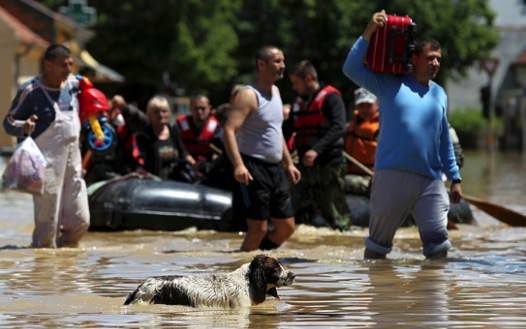Packed into buses, boats and helicopters, carrying nothing but a handful of belongings, tens of thousands fled their homes Saturday in Bosnia and Serbia to escape the worst flooding in a century.
Rapidly rising rivers surged into homes, sometimes reaching up to the second floors, sending people climbing to rooftops for rescue.
Hundreds were also evacuated in Croatia.
Authorities said 35 people have died but warned the death toll could rise. Tens of thousands of homes were left without electricity or drinking water.
The rain caused an estimated 2,100 landslides that covered roads, homes and whole villages throughout hilly Bosnia. The cities of Orasje and Brcko in north-east Bosnia, where the Sava River forms the natural border with Croatia, were in danger of being overwhelmed. Officials ordered six villages to be evacuated.
Rescuers urged people to go to the balconies or rooftops of their houses with bright fabric to make themselves visible.
Brcko mayor Anto Domic said that unless the Bosnian Army is able to reinforce from the air, the city will be flooded completely. He called for the Defence Ministry to use helicopters to lower steel barriers that could be backed by sandbags to contain the water.
“It is a very demanding task,” he said, acknowledging that officials would have no other way to protect the port city of more than 70,000 inhabitants.
Civil protection commander Fahrudin Solak said the Sava River was spilling over another portion of the flood barrier in Orasje, while emergency workers tried desperately to reinforce it with sandbags.
In Serbia, where floods have inundated towns and villages, authorities were braced for high water that could last several more days.
Serbian Prime Minister Aleksandar Vucic said 12 bodies have been found so far in Obrenovac, site of the coal-fired Nikola Tesla power plant, Serbia’s biggest.
Parts of the plant and a nearby mine that provides its fuel were underwater.
Agencies/Canadajournal
 Canada Journal – News of the World Articles and videos to bring you the biggest Canadian news stories from across the country every day
Canada Journal – News of the World Articles and videos to bring you the biggest Canadian news stories from across the country every day



